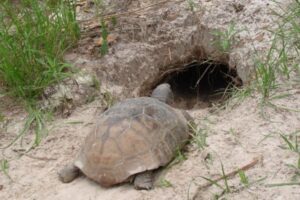
Gopher Tortoise Day, created to increase awareness of the long-lived gentle reptiles who are considered to be threatened in Florida, is April 10. Weedon Island Nature Preserve will celebrate with two events, beginning with a gopher tortoise investigation station on Thursday, along with games, activities and crafts.
On Saturday, join environmental educator George Heinrich on a Gopher Tortoise Trek, looking for the burrows that mark tortoise habitats. Gopher tortoises are keystone species in Florida because they host up to 350 different species. The burrows, which may extend to nearly 50 feet long and 10 feet deep, protect the tortoises and other animals from summer heat, winter cold, fire and predators. In fact, up to 350 different species sleep, hide, and otherwise benefit from these burrows, earning gopher tortoises the title of keystone species. Registration is required, visit https://www.eventbrite.com/e/gopher-tortoise-trek-tickets-1279666620309?mc_cid=d1f634d9dc&mc_eid=1cbba2e07b
In Hillsborough County, the Conservation and Environmental Lands Management team will host their turtle trek on Sunday, April 13, at the Lithia Springs Conservation Park, then hike through the Fishhawk Creek North Nature Preserve. To register, visit Gopher Tortoise Hike | Hillsborough County, FL
While gopher tortoises were harvested for food during the Depression, the largest threat to remaining populations is habitat loss not hungry people. Tortoises prefer high, dry land – where their burrows will hold up during the rainy summer season. They also prefer habitats that are frequently burned, so older shrubs are replaced with a mix of soft grasses and new growth that is more palatable.
